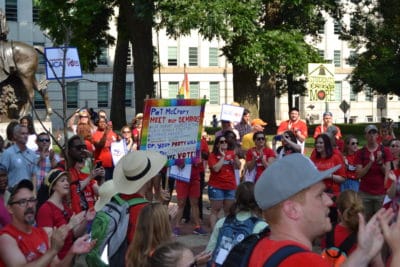
Kellie Slappey Nothstine, the Title IX coordinator at Campbell University, spoke at the John Locke Foundation Monday, explaining the law from its origin to its implementation on college campuses today.
Nothstine described her job — to make sure no one is denied the full educational experience due to discrimination based on sex. She said she often helps sexual assault victims find immediate solutions that the criminal process may take years to provide. That may involve, she said, making sure victims do not have to be in the same classes or dorms as their assailants.
Nothstine took the audience on a journey from 1972, when the original law was passed, to 2016. Now, Title IX’s implications have broadened. In March of this year, ACLU North Carolina filed a lawsuit — along with Lambda Legal and Equality N.C. — claiming that House Bill 2 violates Title IX.
But Nothstine argued that the Department of Education and the Office of Civil Rights have not gone through proper rule-making procedures to expand the law’s language to include sexual orientation and gender identity.
In 2011, when the words “Title IX coordinator” first appeared in a “Dear Colleague” paper from the Office of Civil Rights, Nothstine explained that the language in the letter was “rule language” — or that it forced schools to comply with new regulations or lose federal funding.
However, agencies must go through a rule-making procedure that includes giving notice of the proposed rule, soliciting comments from the public, and considering those comments when drafting the final version.
Nothstine said the Office of Civil Rights did none of those things.
She said that when the Fourth Circuit Court of Appeals had the chance in January to clarify Title IX’s language or force the agencies to comply with the correct procedures in a Virginia lawsuit involving a law similar to HB2, the federal court sent the case back to the lower courts and advised them to use the Department of Education’s interpretation of the law.
She said she expects the ACLU lawsuit to go to federal court, and even predicts the Supreme Court’s involvement. The implications, Nothstine said, will be huge.
“It’s so much bigger than bathrooms and who gets to use what bathroom,” she said. “I’ve also heard people say it’s a fight over sex, or what sex means, and gender, and sexual orientation. It’s so much bigger than that. I think this is a fight about saying what a federal agency can do outside of the law. We have a process that they have to go through, and they’ve surpassed it.”
This event was one of the organization’s weekly Shaftesbury Society presentations. Watch Nothstine’s full speech below.
.


